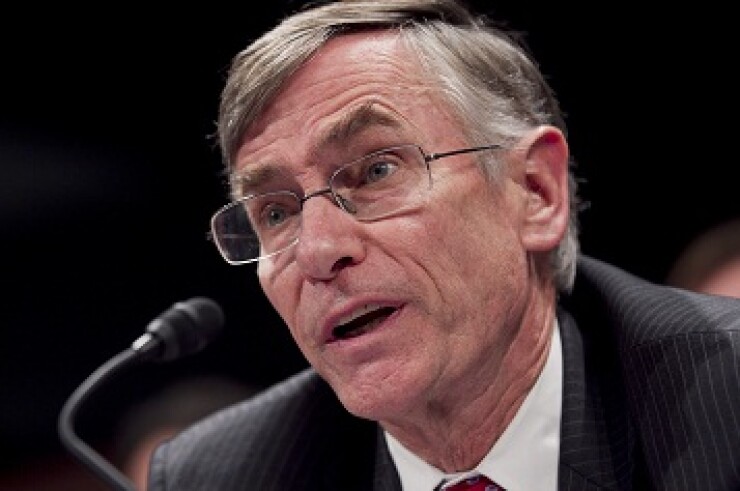
WASHINGTON -- If the Department of Labor's proposal to impose new fiduciary responsibilities on advisors in the retirement space becomes rule, many financial professionals fearing legal liability could abandon that market altogether, and cut off services to low- and middle-income investors, according to FINRA chief Richard Ketchum.
In a speech here at the industry regulator's conference, Ketchum warned that the DoL's fiduciary proposal comes with inadequate guidance to help firms navigate conflicts and ensure that they are engaging in appropriate compensation models when serving retirement plans or individual investors.
Ketchum voiced support for a uniform fiduciary proposal that would apply in equal measure to advisors and broker-dealers, as the SEC has been considering, though he takes issue with some of the criticism of the brokerage sector that has attended the discussions over potential new regulations.
"I continue to believe today that for both investor protection and firm cultural reasons, a best-interest standard for broker-dealers under the securities laws is the direction we must go," Ketchum says. "Yet I have to admit I have been disappointed regarding some of the recent rhetoric about the broker-dealer industry and its regulation that accompanied the Labor proposal. This strident dialogue is a disservice to a wide range of investment firms truly working to serve their clients' interests."
Defending FINRA's oversight of the brokerage industry, Ketchum says he wants to "lower the noise level" in the fiduciary debate. He argues that FINRA officials have been aggressively policing the industry on a number of fronts, including conflicts of interest, self-dealing and advertising violations.
The notion of the broker-dealer environment as an unregulated, anything-goes industry that investors must approach with a "caveat emptor" mentality, Ketchum says, is "simply not true."
Advocates of stronger fiduciary protections counter that advisors too often entice investors to roll over a 401(k) plan into an IRA with higher fees, when their employer-sponsored plan might still be perfectly suitable. They see the Labor Department's proposal as a welcome step to curb those sorts of dubious recommendations.
Ketchum allows that investors might be confused over the different standards that apply to brokers and RIAs, but argues that the Labor Department's proposal would only further muddy the waters with a different and perhaps conflicting set of regulatory requirements.
"Notwithstanding the strength of the present regulatory system, I believe moving to a properly designed best-interest standard is a must going forward," he says. "Notwithstanding their good faith intentions, I believe the current Labor proposal is not the appropriate way to meet that goal."
In particular, he fears that the Labor Department's rules could effectively eliminate the commission-based model of advising retirement plans and investors considering IRA plans.
Then, on the enforcement side, he sees the judicial review provisions as a forbidding process where an arbiter could compel an advisor or firm to defend particular product recommendations or a compensation structure.
"To say the least, making that case is not a simple proof standard," he says
In a meeting with reporters following his speech, Ketchum reiterated his call for the SEC to harmonize fiduciary obligations for brokers and advisors, and also said that FINRA has no immediate plans to revive a controversial proposal for brokers to automatically report trading information. The Comprehensive Automated Risk Data System, or CARDS, was recently shelved by the regulator.
"We're going to step back," he said. "CARDS is not going to move forward in the present form."
Read more:





